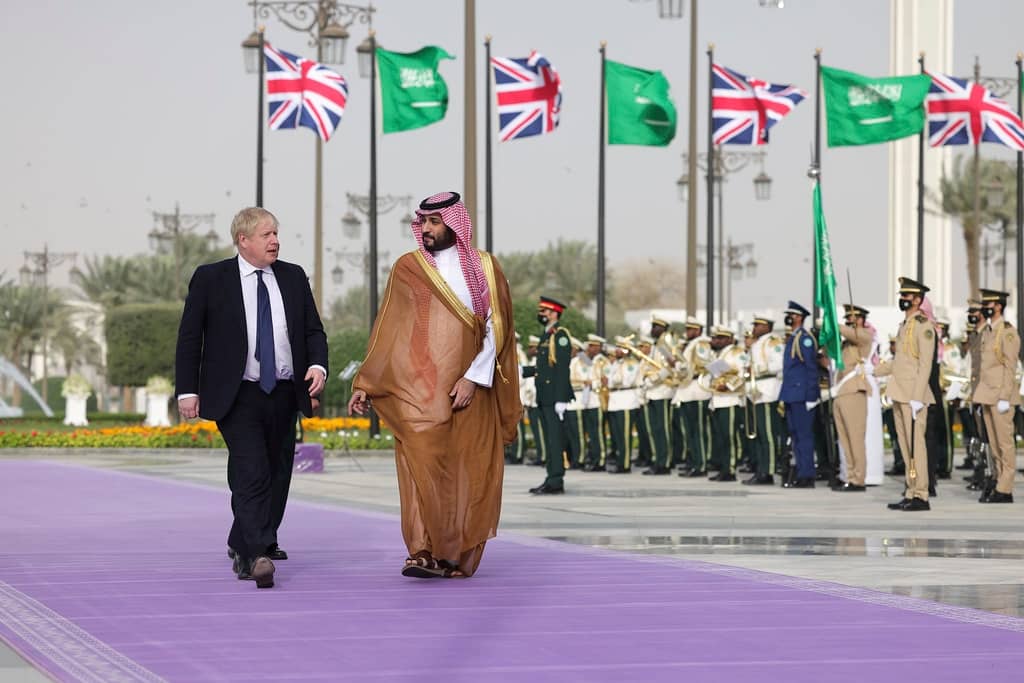War and virtue don’t mix well, especially when it comes to the dirty business of energy supplies. As soon as the Ukraine situation turned nasty the UK government quietly did a turn on winding down North Sea gas, and may possibly do the same on fracking.
And, having sworn off Russian hydrocarbons, Boris is now looking for urgent supplies. In doing so he is talking to some pretty doubtful regimes. Yesterday he visited Saudi Arabia and Abu Dhabi; he has also put out feelers to Qatar. Opposition parties have made hay.
In Scotland, opposition to North Sea gas and ‘extreme fossil fuel ideology’ has come from both Nicola Sturgeon and her delightfully titled ‘minister for zero carbon buildings, active travel and tenants’ rights’, Patrick Harvie. Yesterday it was Labour’s turn, with Keir Starmer accusing the PM of ‘going cap in hand from dictator to dictator’ and Angela Rayner at PMQs talking about the problems of relying on a ‘murderous dictator’ to keep the lights on.
Boris has undoubtedly made mistakes in the past on energy, notably by appeasing the militant green lobby without any clear plan of how to replace fossil fuels. For this he must take the rap. But this time there can be no doubt that he is doing the right thing. More to the point, he is increasingly appearing as a progressive, grown-up politician. If the events of the last three weeks have shown one thing, it is that Labour and the opposition parties are the ones stuck in the past and acting like political babes in the wood. Here’s why.
First, Boris is acting correctly in an emergency. He needs to keep the lights on and make sure people of modest means stay warm in a cool, densely-populated country at the edge of a Europe likely to run seriously short of hydrocarbons very soon. You may not like fossil fuels but their replacements are not yet ready. Voters in Red Wall seats may like the idea of a green transformation in principle but no electorate will thank a government that tells them this year to tighten their belts and look forward to a green energy transition which might not work. That, in essence, is the opposition’s prescription.
Secondly, although he is obviously not letting on, Boris now seems to realise that net zero by 2050 is a promise no government can keep. You cannot sustainably commit a country to ditching fossil fuels within a fixed timetable without a pretty solid assurance that they are replaceable in that time. That assurance simply isn’t there: indeed, with everybody increasingly chasing the green dream and the commodities essential to it, the prospect of a smooth transition slips ever further away. No responsible government can risk the serious impoverishment, and almost certain ugly social unrest, that would undoubtedly result were the country to run out of energy in 2050 because the figures don’t add up.
Unfortunately, this is exactly what the opposition parties choose not to see when they continue to say that the only answer is ever faster abandonment of the fuels we can trust against the promise of breakneck creation of energy sources we can’t. They are engaging in exactly the type of jam tomorrow, wing-and-prayer policymaking that Boris tried and found lacking. The difference is that they still fervently believe in it. Today they are reactionaries, Boris the progressive.
The other point that the opposition parties cling to is that it is somehow moral and praiseworthy for a nation to trim its trade policy to the ethics of its partners. We have seen it in the past, with calls for trade deals to be tied closely to the human rights records of the other parties. Keir Starmer and Angela Rayner’s strident references yesterday to murderous dictators, with the apparent suggestion that Boris should be prepared to eschew buying more oil if Middle Eastern countries fail to sign up to a liberal agenda, show it has returned with a vengeance.
Unfortunately it’s not clear that this approach is either desirable, or even very moral. It’s not simply a matter of selfish interest, though one suspects that if it comes to a choice between keeping the British people warm at reasonable cost next winter or salving a progressive conscience by making a human rights point, most voters would choose the former. Even from the moral viewpoint Boris’s pragmatism is more convincing. Of course there is a clear ethical imperative not to spend billions on directly bankrolling Putin’s war effort. But extreme cases like that aside, it doesn’t follow that we should self-righteously refuse to deal with states like Abu Dhabi by buying their oil or gas. If we do that, we hurt their people rather than their elites, and possibly drive their governments to deal with other less pleasant entities. And even if we do change the regime, there is no guarantee the new one will be any better.
Do you prefer a government that at least for the moment seems determined to do its best to keep the economy active and help you heat your house next winter, or an opposition whose policies combine wishful thinking and virtue-signalling? If I were a working class voter seriously worried about whether I’ll be able to afford gas and electricity, without the luxury of a well-paid job or big savings to tide me over, I know which way I’d jump.






Comments